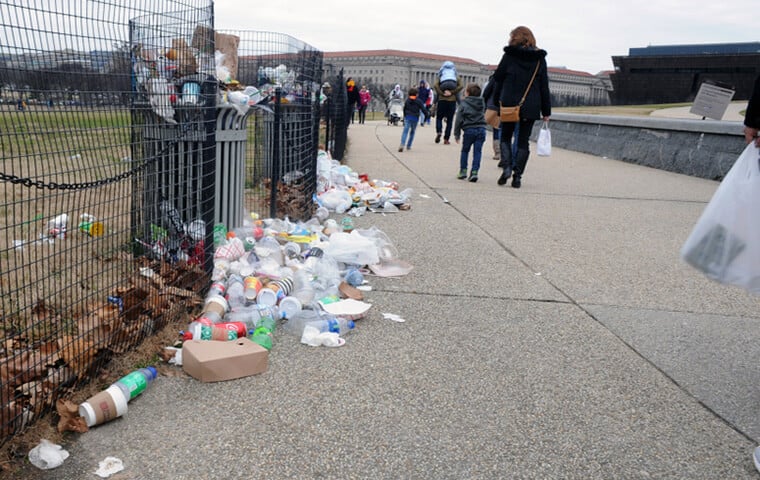 Washington DC January 2019: Without National Park Service personnel to clear it up, people walk by trash uncollected on the National Mall and continue adding to it. The partial government shutdown that began on Dec. 22 was the longest in US history and perhaps a harbinger. Image: Hiroko Tanaka/Shutterstock.com
By: Allan Rosenbaum, Professor of Public Administration at Florida International University
Washington DC January 2019: Without National Park Service personnel to clear it up, people walk by trash uncollected on the National Mall and continue adding to it. The partial government shutdown that began on Dec. 22 was the longest in US history and perhaps a harbinger. Image: Hiroko Tanaka/Shutterstock.com
By: Allan Rosenbaum, Professor of Public Administration at Florida International UniversityDuring the more than four-week partial government shutdown — the 21st since 1976 and longest in history — politicians and pundits spoke frequently of the many costs imposed by this self-inflicted wound. In some cases, the focus was on services not delivered — from maintaining national parks to declining security for air travel. Likewise, and certainly appropriately, there was growing attention on the increasingly desperate plight of those, including many that continued to work every day while not receiving pay checks.
Unfortunately, there was little to no attention paid to what, over the long run, the single greatest tragedy was, and that of prior government shutdowns: The undermining of the average citizen’s faith in the fundamental capacity of the most important enabling institution of any society — its government.
One obvious manifestation is seen in virtually all surveys regarding citizens’ confidence in the ability and likelihood of government to do the right thing. Positive responses in recent decades routinely run at the 20 percent level, a far cry from the almost 80 percent positive response when pollsters first began to ask that question in the late 1950s. In turn, and even more concerning, the decline in citizen confidence in government seems to be leading to a deterioration of faith in our democracy, as well.
Ever since the unexpected presidential victory of a little known Georgia governor, who campaigned on the need to clean up the mess in Washington, it has become routine for America’s political leadership to seek office by attacking the organization they are spending enormous sums of money to seek to lead, the government. In the process, we have seen 40 years of increasingly vigorous attacks on the public sector, from the famous, or infamous, notion that government is the problem, not the solution, to the tea party and beyond.
Unfortunately, many Americans have begun to believe the accuracy of these assertions. More unfortunate, they have forgotten, or never realized, how profoundly important the actions of their government have been for their well being.
The reality is that almost all of the technological advances underlying our current quality of life originated with the ingenuity of government scientists or creativity unleashed and supported through contracts designed and overseen by government administrators. The computer and radar, pioneered by British government scientists during World War II was further developed by the U.S. government; the internet, geographic information systems, hydraulic fracturing — which made the US energy independent — medicines combating many critical illnesses, from AIDS to cancer, all have been significantly shaped by, or are the direct result of, important government research initiatives.
Equally as important as the government’s role in fostering major technological innovation has been its even more critical role in providing for the general welfare. In an era where, for four decades, the dominant political themes have been to lower taxes, cut government regulation and then do it again even more vigorously, it is not surprising that government shutdowns have become a regular part of politics. This ignores the historical reality that the past 40 years have been characterized by middle-class stagnation and dramatically growing inequality. In contrast, the preceding four decades — characterized by the highest tax rates in our history and the most government regulation — produced the most extraordinary economic growth seen in the country.
The increasing frequency of government shutdowns is simply one more symptom of the fact that Americans, and especially their political leadership, have forgotten the extraordinary role our government played during the 20th century in building the America we know today.
This must be changed. It’s not clear, however, whether the current political climate will allow that to happen. But, certainly, if it is to be done, it will take a lot of education and a long term commitment.
There is, however, one way to begin to stop the self-inflicted wounds of government shutdowns that undermine the credibility of a democratic government and penalize the national economy and American people by $1 billion to $2 billion a day. In 2013, Congress and President Obama agreed to continue funding the military during the government shutdown. They enacted legislation that, prospectively, automatically funds government agencies at a continuing level when the appropriations bills necessary to keep them running are not enacted.
This will obviously not resolve the problem of failing to recognize the critical role played by government, and those working in it, but at least it could eliminate one of the factors that undermines this realization.
Allan Rosenbaum is Professor, Public Administration and Director, Institute for Public Management and Center for Democracy and Good Governance at Florida International University’s Stephan J Green School of International and Public Affairs, and is a fellow of the National Academy of Public Administration.
*The views and opinions expressed are those of the author(s) and do not imply endorsement by FEDweek

